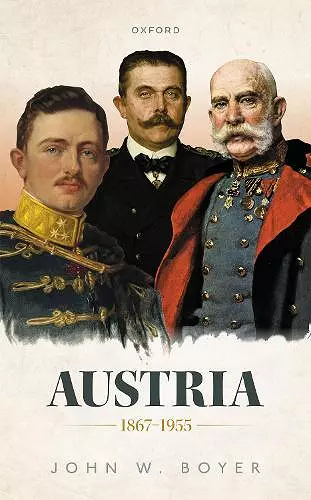Austria 1867-1955
Format:Hardback
Publisher:Oxford University Press
Published:13th Oct '22
Should be back in stock very soon

Austria 1867-1955 connects the political history of German-speaking provinces of the Habsburg Empire before 1914 (Vienna and the Alpine Lands) with the history of the Austrian Republic that emerged in 1918. John W. Boyer presents the case of modern Austria as a fascinating example of democratic nation-building. The construction of an Austrian political nation began in 1867 under Habsburg Imperial auspices, with the German-speaking bourgeois Liberals defining the concept of a political people (Volk) and giving that Volk a constitution and a liberal legal and parliamentary order to protect their rights against the Crown. The decades that followed saw the administrative and judicial institutions of the Liberal state solidified, but in the 1880s and 1890s the membership of the Volk exploded to include new social and economic strata from the lower bourgeoisie and the working classes. Ethnic identity was not the final structuring principle of everyday politics, as it was in the Czech lands. Rather social class, occupational culture, and religion became more prominent variables in the sortition of civic interests, exemplified by the emergence of two great ideological parties, Christian Socialism and Social Democracy in Vienna in the 1890s. The war crisis of 1914/1918 exploded the Empire, with the Crown self-destructing in the face of military defeat, chronic domestic unrest, and bitter national partisanship. But this crisis also accelerated the emergence of new structures of democratic self-governance in the German-speaking Austrian lands, enshrined in the republican Constitution of 1920. Initial attempts to make this new project of democratic nation-building work failed in the 1920s and 1930s, culminating in the catastrophe of the 1938 Nazi occupation. After 1945 the surviving legatees of the Revolution of 1918 reassembled under the four-power Allied occupation, which fashioned a shared political culture which proved sufficiently flexible to accommodate intense partisanship, resulting, by the 1970s, in a successful republican system, organized under the aegis of elite democratic and corporatist negotiating structures, in which the Catholics and Socialists learned to embrace the skills of collective but shared self-governance.
In his brilliant opus magnum John Boyer shows why Austria needed three attempts to build a stable democracy and how co-operation of formerly antagonistic political elites finally succeeded in the years after World War II. * Michael Mesch, Wiener Geschichtsblätter, Vol. 78/3 *
This volume offers a very comprehensive analysis of Austrian history. The extensive bibliography and index add to its usefulness for scholars. Given the in-depth coverage, the text will be most useful to those who are already familiar with the basics of Austrian history. * Choice *
Austria 1867—1955 constitutes a massive undertaking. The presentation is abundant in detail, which, together with a copious index, also recommends the study as a reference work. Its focus lies on political processes and negotiations. In tune with his distinguished scholarly record, John Boyer has provided a well-informed, detailed, and generally sober analysis of modern Austrian politics. His primary audience is specialists in the field. Even if some readers may have appreciated a stronger emphasison long-term patterns and developments, the detailed mastery of so comprehensive a subject deserves nothing but praise. * Peter Thaler, German Studies Review *
This Austrian history is recommended to anyone who wants a deeper, more detailed understanding of how it was that an empire was succeeded by a small republic at the center of Europe. * Steven Beller, Journal of Modern History *
What is most impressive about this admirable work is the extent of scholarship that went into it. Not only does Boyer cite almost 100 pages of secondary literature; he has looked at thirty-three Nachlasse (personal papers) along with other collections in some twenty archives, not to speak of twelve pages of printed primary records and contemporary sources. * Gunter Bischof, Contemporary Austrian Studies *
This book is a magnificent handbook of administrative and political history. It especially complements the more decentered approaches historians have pursued oflate by emphasizing the core and its central administration. Students of Austrian history from undergraduates to professional scholars should onceagain be profoundly grateful to Boyer for his extraordinary contribution to our field. * Pieter M. Judson, Contemporary Austrian Studies *
To my mind, the great benefit of uniting the Imperial and Republican histories in one study is apparent only if the historian presents a compelling new interpretation that allows us to see both periods in a new light. This is a great accomplishment of the book. Writing a synthetic history, Boyer does not offer an easily portable "new take" on modern Austria, and he pragmatically sidesteps the "national indifference" discourse that has shaped Habsburg historiography for the last decade. He tells a story, one with a surprisingly optimistic conclusion, about a resolution of clashing worldviews. * Maureen Healy, Contemporary Austrian Studies *
This is a truly remarkable book, which will provide guidance and inspiration for the next generations of scholars. It provides a political history at its best and covers a time period known for its turmoil and ruptures. With his impressive control of an extensive body of literature, Boyer integrates research that is rarely brought together into one overarching argument. * Peter Becker, Contemporary Austrian Studies *
John Boyer's Austria 1867-1955 is a magnificent achievement. It examines the development of politics, government, foreign policy, and civil society over the period with greater depth and insight than any other synthesis on modern Austrian history in English or German known to this reader. * Gary B. Cohen, Contemporary Austrian Studies *
ISBN: 9780198221296
Dimensions: 242mm x 160mm x 50mm
Weight: 1414g
1152 pages